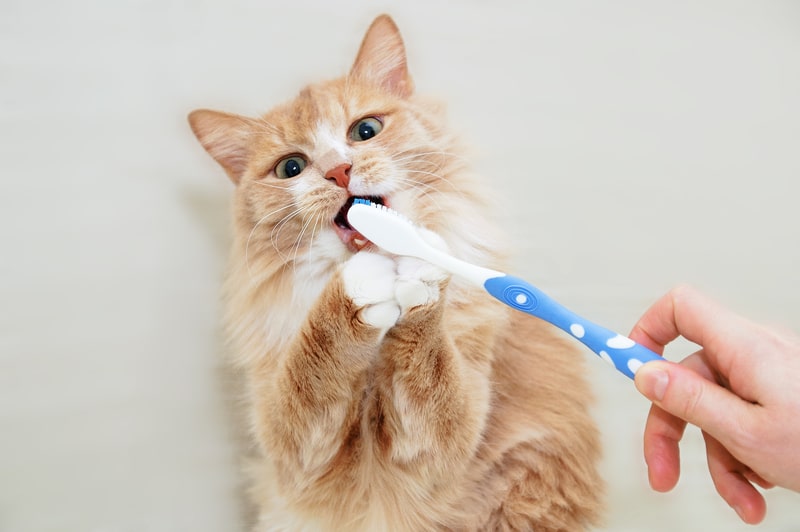

Seven Alternatives to Brushing Cat’s Teeth
It is important to brush your cat’s teeth, but some kitties just absolutely hate it. For those, there are plenty of alternatives to brushing cat’s teeth that you can try out!
Making sure that the teeth of your cat are clean may sound like a task for really extra cat parents, but it can really have a huge impact on the health of your cat. Pet owners need to take it seriously, or else the oral hygiene of the cat can deteriorate quite quickly. If the plaque buildup turns into tartar, it can lead to serious dental illnesses that you don’t want to put your cat through. The bad breath alone can be enough of a motivator to perform regular brushing.
However, we do understand how difficult it can be to convince your cat to sit still long enough to brush its teeth. This is why we are going to outline some alternatives to brushing cat’s teeth that may be easier for owners to do.
Why Is Dental Care for Cats Important?
Wild cats are able to clean teeth by munching on grass or bones; however, tamed or domestic cats don’t really have any other alternative for this at all. Moreover, cats cannot communicate to us verbally if they are sick or in pain. So, when it comes to dental care for cats, pet owners really need to shift their focus from reactive healthcare to preventive measures that can improve their oral health.
Pet owners should be routinely checking the gums and teeth of the cat to ensure that they look healthy and have no tartar buildup. You should note that cats older than three years old often have gum and teeth issues; 1 out of 8 cats have them. This occurs because the plaque, debris, and bacteria can begin to gather around the teeth from whatever food they are eating.
With time, this buildup transforms into hard tartar that irritates the gums and can lead to tooth loss and gingivitis. One of the most common diseases that dogs and cats both face is periodontal disease. This is why the gums, teeth, and other oral structures that are holding the teeth are progressively destroyed. In some cases, periodontal diseases and tartar become so extreme that they cannot be treated. The only solution can be to remove their tooth entirely to reduce the pain that the cat is going through.
Any kind of inflammation and pain in the mouth of the cat will make it hard for cats to drink or eat food. The bad bacteria gathered around their teeth can also enter the bloodstream, which can lead to another host of digestive and internal conditions. Damage to the kidneys and organs can be detrimental to the overall health of the cat.
The best news that pet owners can get, though, is that most of these problems are definitely preventable. There are many steps you can take to ensure that your cat doesn’t face any of these issues. While brushing their teeth regularly is a good measure, there are also alternatives to brushing cat’s teeth.
Alternatives to Brushing Cat’s Teeth
While professional veterinarians do recommend brushing the teeth of your cat routinely, not all cats allow you to do it enough for it to make a difference. Cat owners may also be preoccupied with doing other things to properly set the time aside for brushing their cat’s teeth. Aggressive cats also definitely do not stand for any brushing activity.
If this is your situation, you can take note of the ways outlined below. There are some alternatives to brushing a cat’s teeth that don’t require a lot of effort and are natural.
Note: One thing to remember as pet owners is to take the cat to your local vet for an oral checkup at least once a year.
Changing the Diet of Your Cat
Diet can have a huge impact on the condition of your cat’s teeth. Wild cats rely on grass and bones to clean their teeth, so you can also make sure to change the diet a little bit to accommodate this. Firstly, make sure that they are receiving a good-quality nutritional diet. The diet shouldn’t have empty carbs, artificial coloring, or added preservatives. It should have whole foods and meat that the cat can fill on. Giving them bones to munch on can also be a nice way to let them clean their teeth.
Get Dental Cat Food
There are also oral care foods that don’t involve the use of brushes. You should take a careful look at the ingredients of the food. They should be non-toxic and made with natural ingredients since that it is better for the cat. Some of the foods have herbs that encourage the production of enzymes inside the cat’s mouth. They help by activating the saliva and changing the inherent pH levels and chemistry in the mouth. Over time, the tartar becomes soft and comes off.
You can also choose things with seed extracts or essential oils that provide natural care for the oral region for cats. These help to counter gum and oral diseases.
Use Water Additives and Gels
Dental gels are the best alternative to brushing a cat’s teeth if your cat doesn’t want to go anywhere near the toothbrush. While it may seem like a lot of effort to get the cat to display their teeth enough to put the gel on, it is still better than brushing the teeth. We recommend using these cat dental gels daily to ensure that there is no tooth decay and the teeth are cleaned.
Water additives also take less work than brushing teeth. All you need to do is to pour these additives into the drinking bowl with some water. While it does not have the same long-term efficiency as changing the diet or dental gels, it is still a great option. It will help keep the teeth of the cat clean.
Using Toys or Dental Chews
There are many dental treats that you can rely on for your cat’s dental health. They need to be abrasive and crunchy enough to make sure the plaque cleans right off while the cat is munching on them. One thing that can really help is stimulating and massaging the gums of the cat. It can help reduce the risk of diseases or gum infections in the long run.
Allow Them to Munch on Bones
Bones work in a similar to dental chews since they also help to reduce tartar and plaque on the teeth. You can try to incorporate uncooked, raw bones into their diet. However, make sure to check that they don’t have splinters. We have found that pork, fish, and chicken bones usually have splinters, so always make sure to examine them carefully.
Learn About Oral Issues
We often don’t pay enough attention to the oral health of cats since we may not realize how vital it is. You need to keep an eye out for symptoms of gum diseases and tooth decay since they can affect the long-term health of the kidney, heart, and other organs of the cat. It can end up causing real chronic diseases. You shouldn’t wait for their oral health to become severe before doing something about it.
For example, one common symptom that owners can overlook when it comes to a cat is bad breath. Since they often eat meaty foods and fish, they naturally tend not to have such good breath. If you think it’s starting to smell really foul, do something about it. You should take the cat to the vet at once to get it checked.
Take Your Cat for Checkups to the Vet
It is vital for cat owners to go to the vet and have their oral health checked on. You should have the entire body and oral area of the cat checked and examined once a year. This will make it easier to avoid any rotting teeth, pain, or inflammations.
In Conclusion
Veterinarians definitely recommend making sure that the teeth of the cat are squeaky clean. The gums need to be healthy enough, so taking out the time to clean the teeth is important. This can be a difficult ask, though, which is why it is often recommended to start brushing the teeth or using alternatives to brushing a cat’s teeth early on when the cat is young.
Adult cats tend to be way more aggressive, but there are still some ways around getting too close to their claws. It is better to focus on prevention rather than the cure. You need to keep the teeth of the cat as healthy as you can and take out time to clean them. Responsible cat owners can definitely reduce the risk of their cat getting a serious chronic illness by using alternatives to brushing a cat’s teeth.
Discover how to create a joyful, healthy home for your pet.
Subscribe to your weekly rundown of practice, real life ideas and training tips straight to your inbox.


